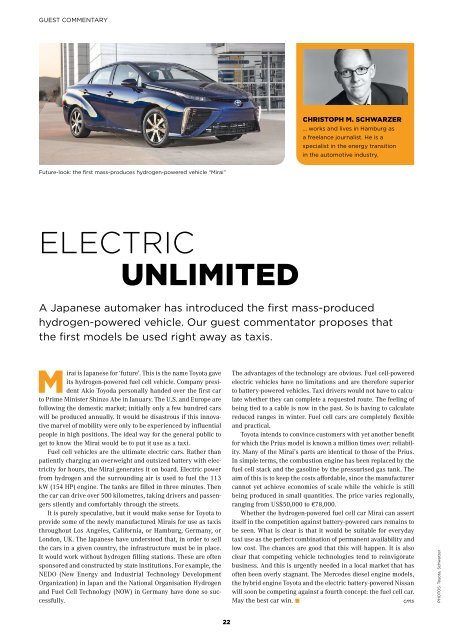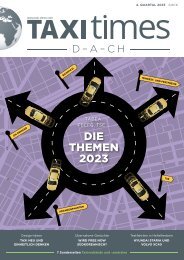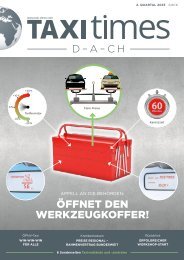You also want an ePaper? Increase the reach of your titles
YUMPU automatically turns print PDFs into web optimized ePapers that Google loves.
GUEST COMMENTARY<br />
COMPETITION<br />
Future-look: the first mass-produces hydrogen-powered vehicle “Mirai”<br />
CHRISTOPH M. SCHWARZER<br />
… works and lives in Hamburg as<br />
a freelance journalist. He is a<br />
specialist in the energy transition<br />
in the automotive industry.<br />
»Highly paid<br />
lobbyists<br />
work for<br />
Uber – in<br />
Washington<br />
alone one<br />
hundred«<br />
ELECTRIC<br />
UNLIMITED<br />
INVESTORS BET ON<br />
<br />
THE BATTERED BOXER<br />
A Japanese automaker has introduced the first mass-produced<br />
hydrogen-powered vehicle. Our guest commentator proposes that<br />
the first models be used right away as taxis.<br />
From Madrid to Rio, from Seoul to Portland. Widespread<br />
bans on Uber have pervaded the past few weeks. Investors are<br />
not impressed – quite the contrary.<br />
Mirai is Japanese for ‘future’. This is the name Toyota gave<br />
its hydrogen-powered fuel cell vehicle. Company president<br />
Akio Toyoda personally handed over the first car<br />
to Prime Minister Shinzo Abe in January. The U.S. and Europe are<br />
following the domestic market; initially only a few hundred cars<br />
will be produced annually. It would be disastrous if this innovative<br />
marvel of mobility were only to be experienced by influential<br />
people in high positions. The ideal way for the general public to<br />
get to know the Mirai would be to put it use as a taxi.<br />
Fuel cell vehicles are the ultimate electric cars. Rather than<br />
patiently charging an overweight and outsized battery with electricity<br />
for hours, the Mirai generates it on board. Electric power<br />
from hydrogen and the surrounding air is used to fuel the 113<br />
kW (154 HP) engine. The tanks are filled in three minutes. Then<br />
the car can drive over 500 kilometres, taking drivers and passengers<br />
silently and comfortably through the streets.<br />
It is purely speculative, but it would make sense for Toyota to<br />
provide some of the newly manufactured Mirais for use as taxis<br />
throughout Los Angeles, California, or Hamburg, Germany, or<br />
London, UK. The Japanese have understood that, in order to sell<br />
the cars in a given country, the infrastructure must be in place.<br />
It would work without hydrogen filling stations. These are often<br />
sponsored and constructed by state institutions. For example, the<br />
NEDO (New Energy and Industrial Technology Development<br />
Organization) in Japan and the National Organisation Hydrogen<br />
and Fuel Cell Technology (NOW) in Germany have done so successfully.<br />
The advantages of the technology are obvious. Fuel cell-powered<br />
electric vehicles have no limitations and are therefore superior<br />
to battery-powered vehicles. <strong>Taxi</strong> drivers would not have to calculate<br />
whether they can complete a requested route. The feeling of<br />
being tied to a cable is now in the past. So is having to calculate<br />
reduced ranges in winter. Fuel cell cars are completely flexible<br />
and practical.<br />
Toyota intends to convince customers with yet another benefit<br />
for which the Prius model is known a million times over: reliability.<br />
Many of the Mirai’s parts are identical to those of the Prius.<br />
In simple terms, the combustion engine has been replaced by the<br />
fuel cell stack and the gasoline by the pressurised gas tank. The<br />
aim of this is to keep the costs affordable, since the manufacturer<br />
cannot yet achieve economies of scale while the vehicle is still<br />
being produced in small quantities. The price varies regionally,<br />
ranging from US$50,000 to €78,000.<br />
Whether the hydrogen-powered fuel cell car Mirai can assert<br />
itself in the competition against battery-powered cars remains to<br />
be seen. What is clear is that it would be suitable for everyday<br />
taxi use as the perfect combination of permanent availability and<br />
low cost. The chances are good that this will happen. It is also<br />
clear that competing vehicle technologies tend to reinvigorate<br />
business. And this is urgently needed in a local market that has<br />
often been overly stagnant. The Mercedes diesel engine models,<br />
the hybrid engine Toyota and the electric battery-powered Nissan<br />
will soon be competing against a fourth concept: the fuel cell car.<br />
May the best car win. •<br />
cms<br />
PHOTOS: Toyota, Schwarzer<br />
ILLUSTRATION: Löffler<br />
With its service UberPOP, Uber<br />
seems to be in a boxing<br />
match and taking a massive<br />
pounding at every round. A ban here, an<br />
indictment there, a data scandal here, a<br />
rape there. Uber is getting the count on<br />
every round, and it’s working its way up<br />
to ten. Even so, the bets on the company<br />
increase every time the gong is struck.<br />
Investment companies are putting more<br />
money behind Uber. The company now has<br />
a value of $40 billion (see the comparison<br />
on page 25).<br />
Filthy rich, but illegal. The American<br />
company is being shown its limits, especially<br />
with its UberPOP service. Governments<br />
and courts in more and more<br />
countries are pronouncing unequivocal<br />
bans. UberPOP has been illegal in Rio de<br />
Janeiro since December; in Europe, the service<br />
was banned in the Netherlands and<br />
Spain, and as of the new year in France. In<br />
Asia, Uber has been banned in India, South<br />
Korea and Thailand. China followed suit at<br />
the beginning of January. The Ministry of<br />
Transportation banned several ride-sharing<br />
apps used to contact private drivers without<br />
taxi licences.<br />
Even in Uber’s country of origin, the group<br />
and its domestic competitor Lyft have each<br />
had to retreat. Operations were banned by<br />
the State of Nevada on 26 November, and<br />
operations were suspended in Portland,<br />
Oregon on 21 December.<br />
In many other regions, the Uber management<br />
was not deterred. With the help<br />
of billions of dollars from investment bankers<br />
who continue to support the company<br />
in spite of negative headlines (in India, for<br />
example, an Uber driver was reported to<br />
have raped a woman), Travis Kalanick and<br />
his employees pay the fines that are due<br />
or hire expensive lawyers to appeal such<br />
decisions in court. Highly paid lobbyists<br />
also work for Uber. In Washington alone<br />
there are said to be 100 lobbyists who are<br />
in close contact with local politicians.<br />
But even these measures fail in many<br />
places. In Germany, the objection by an<br />
administrative court in Hamburg to the<br />
UberPOP ban was dismissed by the highest<br />
court authority back in November. In order<br />
to keep the service afloat, Uber is now<br />
offering rides at dumping prices below<br />
vehicle costs in Hamburg, Berlin and Düsseldorf,<br />
which is legal under German law.<br />
The drivers are said to receive payments<br />
to make up for the low fares.<br />
In Spain, the court pronounced a ban at<br />
the beginning of December, yet Uber continued<br />
to offer UberPOP. Spain’s Supreme<br />
Court pulled the plug on 27 December. The<br />
telecommunications services and credit<br />
card service providers were then ordered<br />
not to provide service to Uber ‘effective<br />
immediately’. The company was thereby<br />
deprived of the technical foundation of its<br />
business idea. A few days later, Spain’s<br />
Uber manager Carles Lloret announced the<br />
discontinuation of the UberPOP service.<br />
This brings us to another boxing match<br />
analogy: brought down by a technical<br />
knockout. The investors will not be pleased<br />
at how this ends. n<br />
jh<br />
DID YOU KNOW …<br />
<strong>Taxi</strong> <strong>Times</strong> reports twice a week<br />
in its newsletter on all the<br />
Uber developments and many<br />
other current events from the taxi<br />
industry. Register now at<br />
www.taxi-times.com.newsletter.<br />
22 TAXI MARCH / <strong>2015</strong><br />
23


















